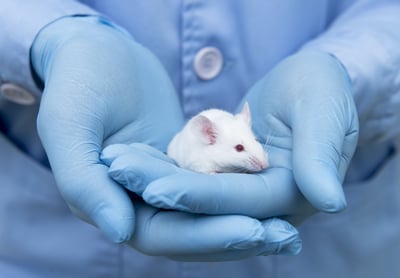FORCE's eXamining the Relevance of Articles for You (XRAY) program looks behind the headlines of cancer news to help you understand what the research means for you.
XRAY is a reliable source of hereditary cancer research-related news and information.
Learn more about the XRAY program
Keyword: ATM
Relevance: Medium-Low


Strength of Science: Medium-Low


Research Timeline: Animal Studies


Study : Cancer “vaccine” injected directly into tumors works in mice
Relevance: Medium-Low


Strength of Science: Medium-Low


Research Timeline: Animal Studies


Most relevant for: People with advanced cancers
Immunotherapy is treatment that uses the immune system to fight cancer. Still in its infancy, it is a promising therapy that is changing how certain cancers are treated. A new study reports that tumors in lab mice were eliminated when they were injected with two immune system-enhancing agents. This new approach is called in situ (at the original site) vaccination because the injections are given directly into the tumors. It worked on several different types of mouse tumors, including lymphomas and breast tumors. This approach may be safer than conventional immunotherapy because it uses very low doses of the agents and it does not require tumors to have particular markers. (02/23/18)
Read More
Study : Survival and mutation status in breast cancer patients under age 40
Most relevant for: Young breast cancer patients
Studies have found conflicting rates of survival for BRCA mutation carriers who develop breast cancer, reporting better, worse and similar outcomes compared to patients with sporadic breast cancer. New results of the large Prospective Outcomes in Sporadic versus Hereditary (POSH) breast cancer study found no difference in survival rates between the two groups. The study also concluded that among young triple-negative breast cancer patients during the first 2 years after diagnosis, BRCA mutation carriers had an initial survival advantage compared to women without a BRCA mutation. (02/15/18)

Article : Oncoplastic breast-conserving surgery with BioZorb® technology
Most relevant for: Women undergoing lumpectomy for breast cancer
The January 22, 2018 issue of The Columbian included an interview with Dr. Anne Peled in its online report, “Breast cancer surgeon diagnosed with breast cancer advocates oncoplastic surgery.” Dr. Peled is a 37-year-old breast cancer surgeon and plastic surgeon from California who was recently diagnosed with breast cancer. She underwent oncoplastic lumpectomy—a single surgery that removes the tumor and rearranges the remaining tissue to eliminate any resulting breast deformity. Peled’s procedure included a relatively new technology that she uses for her own patients: an implanted BioZorb® marker, a small device that improves precise targeting of radiation therapy and cosmetic outcome. (2/8/18)
Read More
Relevance: Medium-High


Strength of Science: Medium-High


Research Timeline: Post Approval


Study : What is the risk of breast cancer recurrence after nipple-sparing mastectomy?
Relevance: Medium-High


Strength of Science: Medium-High


Research Timeline: Post Approval


Most relevant for: Breast cancer patients who are considering or have had a nipple sparing mastectomy
Nipple-sparing mastectomy (NSM) offers better cosmetic results for women who have immediate breast reconstruction (at the same time as their mastectomy). Over the past decade, NSM has gained popularity among surgeons and patients. Studies show that women who keep their own nipples have higher rates of satisfaction and psychological well-being after mastectomy and reconstruction compared to women who lose their nipples. However, little data exists on the long-term risk of recurrence following NSM. New research adds to a growing body of evidence suggesting that risk of recurrence is low after NSM in carefully selected patients with breast cancer. (1/25/18)
Read More
Relevance: Medium


Quality of Writing: High


Research Timeline: Human Research


Article : The buzz around MonaLisa Touch
Relevance: Medium


Quality of Writing: High


Research Timeline: Human Research


Most relevant for: Women experiencing vaginal symptoms from menopause
THIS INFORMATION HAS BEEN UPDATED. The FDA issued an alert in July, 2018 noting that laser or radiofrequency devices that have received FDA clearance are ONLY cleared for treating abnormal or pre-cancerous cervical or vaginal tissue and genital warts and have NOT been approved for vaginal rejuvenation. There are currently clinical trials enrolling women to study whether laser and radiofrequency devices can improve vaginal atrophy and other menopausal symptoms.
For many young breast cancer survivors and high-risk women, the side effects from early menopause after treatment and surgery can negatively impact their personal lives. This XRAYS looks at one of the many recent media articles on a laser procedure called MonaLisa Touch. The article, "Is Laser Treatment for Vaginal Atrophy Safe?" was published online in 2017 by FOX News and written by Dr. Manny Alvarez. XRAYS will discuss what this laser procedure actually is and how it may impact a young breast cancer patient’s life after treatment. (1/19/18)
Read More
Relevance: Medium-Low


Strength of Science: Medium-Low


Research Timeline: Human Research


Study : No new high-risk breast cancer genes here
Relevance: Medium-Low


Strength of Science: Medium-Low


Research Timeline: Human Research


Most relevant for: People with a family history of breast cancer but no known inherited mutation
While some of the genes that cause hereditary breast cancer are known (for example, inherited mutations in genes like BRCA, ATM and PALB2), others remain unidentified. Two studies found 72 DNA changes (also known as “variants” or “SNPs”) that affect breast cancer risk. These variants are different from mutations in genes that dramatically increase cancer risk. Most of these new variants are located outside of the portion of DNA that is used to make proteins. Further research is needed on these new variants before they can be used by doctors to help people understand and manage their risk for cancer. (1/12/18)
Read More
Relevance: Medium-High


Strength of Science: Medium-High


Research Timeline: Post Approval


Study : Does extending hormonal therapy impact risk of breast cancer recurrence?
Relevance: Medium-High


Strength of Science: Medium-High


Research Timeline: Post Approval


Most relevant for: Women with early-stage ER-positive breast cancer
Hormonal therapy significantly reduces the risk of recurrence for women with early-stage estrogen receptor-positive breast cancer. Standard hormonal therapy is given for 5 years; extending that therapy for a longer period offers additional protection but has added side effects. This study looked at women who stopped hormonal therapy after 5 years and identified factors that may guide the decision to extend treatment. (12/21/17)
Read More
Relevance: High


Strength of Science: Medium-High


Study : Birth control and breast cancer risk among younger women
Relevance: High


Strength of Science: Medium-High


Most relevant for: Young women on, or considering taking hormonal birth control
On December 7, 2017 the New England Journal of Medicine published results from a study by Lina Mørrch of the University of Copenhagen and colleagues showing that hormonal contraceptives (birth control) increase the risk of breast cancer. The study is unique because it is one of the first to specifically assess the breast cancer risk associated with newer, low-dosage methods of contraception. The large and significant effort analyzed medical data of nearly 1.8 million young women in Denmark on average for over 10.9 years. Results were covered widely in the U.S. by many major media outlets, including the New York Times, USA Today, Forbes and Time. (12/14/17)
Read More
Guideline : Can MammaPrint guide treatment decisions?
Most relevant for: Women diagnosed with ER-positive, Her2-negative early-stage breast cancer with 0-3 positive nodes
The American Society of Clinical Oncology (ASCO) updated its guidelines for MammaPrint, a genomic tumor test that guides treatment decisions for patients with early-stage invasive breast cancer. The update was based on results from the MINDACT study (11/16/17).
Read More
Relevance: Medium-Low


Strength of Science: Medium


Research Timeline: Animal Studies


Study : Can chemotherapy before surgery fuel breast cancer metastasis?
Relevance: Medium-Low


Strength of Science: Medium


Research Timeline: Animal Studies


Most relevant for: Newly diagnosed breast cancer patients
Some breast cancer patients are given neoadjuvant (before surgery) chemotherapy. However, some recent studies have raised concerns that neoadjuvant treatment might actually trigger cancer spread in certain situations. In the current study, researchers used mouse models and human breast cancers to explore this possibility. (10/10/17)
Read More